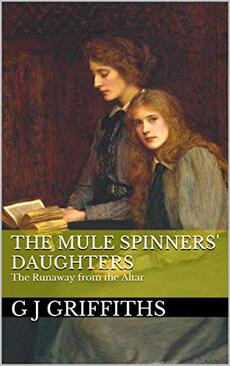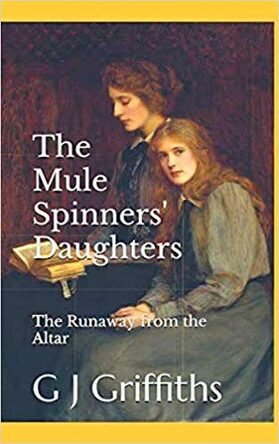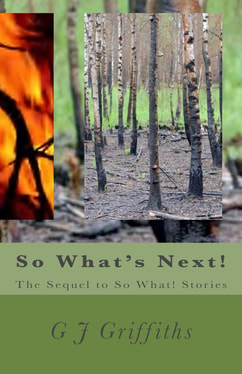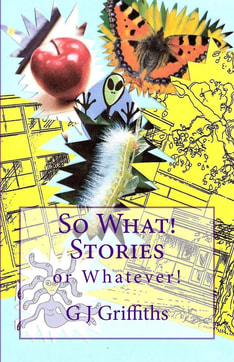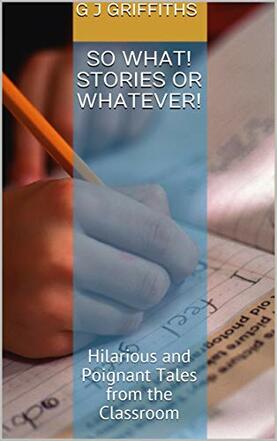THE MULE SPINNERS' DAUGHTERS:
“… Sebastian: But there is an obstacle, a principle of hers that she’s read of in a book by a woman called Mary Wollstonecraft...” “… Women should be wives and companions to their husbands…”Did the mother of Mary Shelley fill the farm girl’s head with too many ideas of feminism? When Sally Sefton runs away from Sebastian at the altar on her wedding day there is a desperate chase to find her. Some of her friends think they know why she ran. But only Cathy Priestley thinks she knows where. Her chief bridesmaid suspects Sally may have joined the Christian Israelites. Will they find her before the group sails on a missionary tour abroad? The split causes a bitter dispute between Sebastian and Wesley, her brother. While feelings are running so high there seems to be no hope of reconciliation between the families.
Click on the book cover to order from Amazon UK
Click here to order from Amazon USA
“… Sebastian: But there is an obstacle, a principle of hers that she’s read of in a book by a woman called Mary Wollstonecraft...” “… Women should be wives and companions to their husbands…”Did the mother of Mary Shelley fill the farm girl’s head with too many ideas of feminism? When Sally Sefton runs away from Sebastian at the altar on her wedding day there is a desperate chase to find her. Some of her friends think they know why she ran. But only Cathy Priestley thinks she knows where. Her chief bridesmaid suspects Sally may have joined the Christian Israelites. Will they find her before the group sails on a missionary tour abroad? The split causes a bitter dispute between Sebastian and Wesley, her brother. While feelings are running so high there seems to be no hope of reconciliation between the families.
Click on the book cover to order from Amazon UK
Click here to order from Amazon USA
ON THIS PAGE: A selection of reviews and extracts from G J G's books.
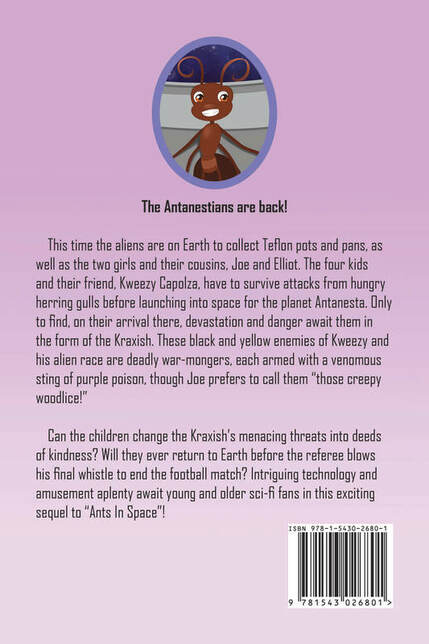 Click on the back cover for the Amazon UK link.
Click on the back cover for the Amazon UK link.
Here is an extract from Ants In Space when the girls are on the Aliens' spaceship. I hope you enjoy it!
Kweezy came over to Lara and held her other hand as the roaring noise suddenly went quieter and quieter, until there was just a gentle kind of swishing sound. It was just like the sound of a warm breeze in the trees on a bright summer day. A little like the day they had left behind on Earth and the sisters felt sad for a moment.
'That is correct, Agorrl. Nothing to worry about. It is only our rocket engines pushing us through the gravity of your Earth. We will now travel at such velocity that we will reach Antanesta before you have time to finish your meal.'
As Kweezy Capolza finished speaking, another ant-person came to them with a green tray, of what seemed to be large green leaves that had small lumps of green porridge on them. The sisters looked at each other and said, ‘Yuk! I don’t feel very hungry anymore.’ But Kweezy said:
'You must try it, Agorrl, it is delicious! Mm, mm!'
So Lara lifted a green leaf of green porridge to her mouth, but paused, with her eyes closed, to sniff it first. Then she said to Eva, ‘Hm, it smells lovely, like honey and ice cream and strawberries, all at the same time.’
This immediately made Eva do the same thing. ‘And I can smell lemon meringue as well I think.’ Then Eva, still with her eyes closed, licked the green porridge to taste it.
‘Wow!’ said Eva. ‘Wow! You’re right, Kweezy, it’s scrummy!’ She opened her eyes and using the crystal spoon from the tray began to eat up the green porridge. Lara watched her and began to eat too.
‘Mm, mm! Scrummy, yummy in my tummy,’ said Lara, keeping one eye closed.
'Is something wrong with your eyes, Agorrl?'
‘What! Sorry! Er, I beg your pardon?’ replied Lara, trying to be polite as her mummy had taught her. ‘Oh, my eyes. Yes, I see, or rather I don’t see. That is, when they’re closed that is.’ She giggled when she saw the puzzled look on Zweezy Capolza’s face and the twisting and untwisting of his antennae above his head.
‘Lara,’ said Eva, ‘Why do you keep closing one eye and then the other eye while you’re eating? It is a bit confusing for everyone.’
It was then that they noticed that lots of the ant-person crew had gathered around to watch the girls eat their green porridge. They were curious to see if they enjoyed it. Anxious not to offend anyone Eva said, ‘This is really, really scrummy.’
Lara said, ‘Yes, it is really delicious. It’s a pity that I’ve eaten it all. But now it’s gone I can open both eyes again.’ She smiled and continued, ‘It’s just that I cannot bear to look at green porridge while I’m eating it. So I have to keep an eye open so I know where my crystal spoon is going. I don’t want to put green porridge in my hair or my ears by mistake, do I?’ There was a pause while all the onlookers thought about what she had said.
Hee, hee! giggled one or two. Har, har! chuckled three or four.
Ho, ho, ho, ho! Hee, hee, hee! Har, har, har!
And now everyone was laughing and chuckling and giggling at the girls. The two sisters had to join in and wiped their eyes because it seemed such a funny thing to say.
Kweezy came over to Lara and held her other hand as the roaring noise suddenly went quieter and quieter, until there was just a gentle kind of swishing sound. It was just like the sound of a warm breeze in the trees on a bright summer day. A little like the day they had left behind on Earth and the sisters felt sad for a moment.
'That is correct, Agorrl. Nothing to worry about. It is only our rocket engines pushing us through the gravity of your Earth. We will now travel at such velocity that we will reach Antanesta before you have time to finish your meal.'
As Kweezy Capolza finished speaking, another ant-person came to them with a green tray, of what seemed to be large green leaves that had small lumps of green porridge on them. The sisters looked at each other and said, ‘Yuk! I don’t feel very hungry anymore.’ But Kweezy said:
'You must try it, Agorrl, it is delicious! Mm, mm!'
So Lara lifted a green leaf of green porridge to her mouth, but paused, with her eyes closed, to sniff it first. Then she said to Eva, ‘Hm, it smells lovely, like honey and ice cream and strawberries, all at the same time.’
This immediately made Eva do the same thing. ‘And I can smell lemon meringue as well I think.’ Then Eva, still with her eyes closed, licked the green porridge to taste it.
‘Wow!’ said Eva. ‘Wow! You’re right, Kweezy, it’s scrummy!’ She opened her eyes and using the crystal spoon from the tray began to eat up the green porridge. Lara watched her and began to eat too.
‘Mm, mm! Scrummy, yummy in my tummy,’ said Lara, keeping one eye closed.
'Is something wrong with your eyes, Agorrl?'
‘What! Sorry! Er, I beg your pardon?’ replied Lara, trying to be polite as her mummy had taught her. ‘Oh, my eyes. Yes, I see, or rather I don’t see. That is, when they’re closed that is.’ She giggled when she saw the puzzled look on Zweezy Capolza’s face and the twisting and untwisting of his antennae above his head.
‘Lara,’ said Eva, ‘Why do you keep closing one eye and then the other eye while you’re eating? It is a bit confusing for everyone.’
It was then that they noticed that lots of the ant-person crew had gathered around to watch the girls eat their green porridge. They were curious to see if they enjoyed it. Anxious not to offend anyone Eva said, ‘This is really, really scrummy.’
Lara said, ‘Yes, it is really delicious. It’s a pity that I’ve eaten it all. But now it’s gone I can open both eyes again.’ She smiled and continued, ‘It’s just that I cannot bear to look at green porridge while I’m eating it. So I have to keep an eye open so I know where my crystal spoon is going. I don’t want to put green porridge in my hair or my ears by mistake, do I?’ There was a pause while all the onlookers thought about what she had said.
Hee, hee! giggled one or two. Har, har! chuckled three or four.
Ho, ho, ho, ho! Hee, hee, hee! Har, har, har!
And now everyone was laughing and chuckling and giggling at the girls. The two sisters had to join in and wiped their eyes because it seemed such a funny thing to say.
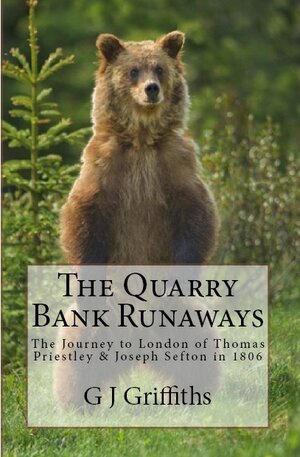 Follow the 200 mile journey with the runaway apprentices!
Follow the 200 mile journey with the runaway apprentices!
Some of The Quarry Bank Runaways Reviews:
5.0 out of 5 stars “What would the next few days bring? It was a question they kept asking each other…”
By Wiggins on 27 September 2017
Format: Kindle Edition
For me, "The Quarry Bank Runaways: The Journey to London of Thomas Priestly and Joseph Sefton in 1806", is initially reminiscent of Mark Twain’s, "The Adventures of Tom Sawyer", and, "Adventures of Huckleberry Finn". Even later on in the story it’s still reminiscent of Twain, in that on the surface it’s about two runaways evading ‘bad people’ who could and would swindle them—or worse, send them back to the Mill—while also meeting ‘good people’ who help them in times of need as well as showing them that not all people are bad and some families are ‘normal’ even though they, too, are poor. But there’s also the undercurrent of a much bigger picture going on: The egregious practice of the indentured servitude of children—otherwise known as slavery. Griffiths didn’t sugarcoat it and I applaud him for that.
Traveling back in time to visit a corner of this world so vibrantly described was an absolute pleasure to experience. The descriptions of everything: the land, history, people, socioeconomic backgrounds and lifestyles, even the food, were a delightful decadence. I was mesmerized by the rich and colorful dialect woven into the characters’ dialogue. Some of it reminded me of the Gullah language. Example: “Ah” for “I”. I also took note of, and enjoyed, the subtle changes in regional dialects of the various characters.
The historical aspects, which I suspect were heavily researched by Griffiths—and probably born from impassioned heartstrings—added credibility to the story, capturing the accuracy of our shameful, not-so-ancient past while also maintaining the stunning and quintessential essence of young Joe’s and Tommy’s journey.
I reached a point where I clung to Joe’s and Tom’s adventurous voyage across the countryside and rolling hills to reunite with their mothers—a delicate reality I can relate to, though my own mother is much farther away from me than London. I rooted for them to make it, became a tagalong in their legging journey.
But let us not forget one moral interpretation of, "The Quarry Bank Runaways"; a story of the born elite vs. the born downtrodden. And though many conditions and circumstances have changed, certainly improved… how far have we really come in bettering the lives of those born silver-spoonless?
This novel glimpses into a past that for all practical purposes can best be defined as human agony designed by ‘the haves’ (those with wealth and status) who then wield it upon the ‘have-nots’ (the vast majority of human civilization). Why was there a differentiating spoon? Why is there still one today? Why is it still our division? Though we’ve come a long way from the widespread practice of indentured servitude of children and the poor, it does still occur, proving we still have far to go—still on our journey—before human civilization can call itself civil and truly altruistic.
5.0 out of 5 stars “What would the next few days bring? It was a question they kept asking each other…”
By Wiggins on 27 September 2017
Format: Kindle Edition
For me, "The Quarry Bank Runaways: The Journey to London of Thomas Priestly and Joseph Sefton in 1806", is initially reminiscent of Mark Twain’s, "The Adventures of Tom Sawyer", and, "Adventures of Huckleberry Finn". Even later on in the story it’s still reminiscent of Twain, in that on the surface it’s about two runaways evading ‘bad people’ who could and would swindle them—or worse, send them back to the Mill—while also meeting ‘good people’ who help them in times of need as well as showing them that not all people are bad and some families are ‘normal’ even though they, too, are poor. But there’s also the undercurrent of a much bigger picture going on: The egregious practice of the indentured servitude of children—otherwise known as slavery. Griffiths didn’t sugarcoat it and I applaud him for that.
Traveling back in time to visit a corner of this world so vibrantly described was an absolute pleasure to experience. The descriptions of everything: the land, history, people, socioeconomic backgrounds and lifestyles, even the food, were a delightful decadence. I was mesmerized by the rich and colorful dialect woven into the characters’ dialogue. Some of it reminded me of the Gullah language. Example: “Ah” for “I”. I also took note of, and enjoyed, the subtle changes in regional dialects of the various characters.
The historical aspects, which I suspect were heavily researched by Griffiths—and probably born from impassioned heartstrings—added credibility to the story, capturing the accuracy of our shameful, not-so-ancient past while also maintaining the stunning and quintessential essence of young Joe’s and Tommy’s journey.
I reached a point where I clung to Joe’s and Tom’s adventurous voyage across the countryside and rolling hills to reunite with their mothers—a delicate reality I can relate to, though my own mother is much farther away from me than London. I rooted for them to make it, became a tagalong in their legging journey.
But let us not forget one moral interpretation of, "The Quarry Bank Runaways"; a story of the born elite vs. the born downtrodden. And though many conditions and circumstances have changed, certainly improved… how far have we really come in bettering the lives of those born silver-spoonless?
This novel glimpses into a past that for all practical purposes can best be defined as human agony designed by ‘the haves’ (those with wealth and status) who then wield it upon the ‘have-nots’ (the vast majority of human civilization). Why was there a differentiating spoon? Why is there still one today? Why is it still our division? Though we’ve come a long way from the widespread practice of indentured servitude of children and the poor, it does still occur, proving we still have far to go—still on our journey—before human civilization can call itself civil and truly altruistic.
5.0 out of 5 stars Griffiths greatest book yet!
By Christine McBryde on 11 April 2017
Format: Kindle Edition
An amazing read. I found myself not able to put the book down. It is an interesting and fascinating look into the life and times of early London, with child slave labor and the ill treatment of the poor class. You feel like you are on the journey with the two main characters, looking over your shoulder at every moment, hoping and praying they do not get caught.
I would HIGHLY recommend this book for anyone, history buff or not.
This is probably G.J. Griffiths finest book yet.
A sidenote: The dialogue is written with varying dialects which would've been seen during the early times of London, with different slang terms here and there. Fortunately, the author provides a glossary for those who need some of the dialogue deciphered, which is truly helpful.
By Christine McBryde on 11 April 2017
Format: Kindle Edition
An amazing read. I found myself not able to put the book down. It is an interesting and fascinating look into the life and times of early London, with child slave labor and the ill treatment of the poor class. You feel like you are on the journey with the two main characters, looking over your shoulder at every moment, hoping and praying they do not get caught.
I would HIGHLY recommend this book for anyone, history buff or not.
This is probably G.J. Griffiths finest book yet.
A sidenote: The dialogue is written with varying dialects which would've been seen during the early times of London, with different slang terms here and there. Fortunately, the author provides a glossary for those who need some of the dialogue deciphered, which is truly helpful.
Would You Like To Review A Book?
Goodreads have a Review Group where you can receive a copy of the book you want to read and review:
Click here if you want to find out more.
Goodreads have a Review Group where you can receive a copy of the book you want to read and review:
Click here if you want to find out more.
An insightful read, 18 Aug. 2017
By Mrs Bernadette Reid
Verified Purchase(What is this?)
This review is from: The Quarry Bank Runaways: The Journey to London of Thomas Priestley & Joseph Sefton in 1806 (Kindle Edition)
This is my first Saturday off since March and I ‘m spending part of it reviewing a book I have just read on my kindle. That’s how much I enjoyed the book I ve just finished. It’s a short read. It took me 3 hours and I read most of it yesterday in the inspirational setting of the top garden at Quarry Bank Mill. I want to recommend this to you all. It’s a work of historical fiction but well supported by the known facts provided by the boys themselves before the Middlesex assizes. It tells an imagined journey they led from Cheshire to London and the characters they meet along the way. It suggests how they supported themselves, where they may have slept and how they travelled. One of the most charming elements of the book is the dialect that the author has used at great lengths to explain the story. In the reviews I read on Amazon the readers criticised the use of dialect but for me it was essential in emphasising the terms and what they meant. I had no difficulty recognising some of the terms from my own community and that of my parents and grandparents. In both northern and southern twang author cleverly draws out the plot. It gives insight into the historical times they led and creates background relating to the fear of the French invasion, the war with France and its consequences. It touches on the precursors to Luddites, social reform and the establishment of the factory acts. (It was a bit of a stretch to imagine the boys actually met Robert Peel though.) It contrasts the economic gap between rich and poor. Religious persecution is explained and it is faithful to what we know about the Greg family and life as we understand it at Quarry Bank Mill during the early part of the 19th Century.
I did find the boy’s plight amusing in part (though I’m sure this wasn’t the intention of the author) and identified with the lads drawing parallels with my own youth growing up in a mill town as I did. One thing that strikes me is the kindness shown to them by strangers and the author contrasts this with the officiousness of those in the employ of the Greg’s and the ruling class. The thread running through this book is the indomitability of the human spirit where family love is concerned and the book is touching and heart rending especially since you know it’s based on a true story.
I don t like to write a review without making at least one criticism and I thought I had found a term which was anachronistic. I thought the use of constable would be related to the establishment of the first police force but when I looked it up the people of the internet informed me the term has been in use since the 13th Century. You do have to keep reminding yourself this is a work of fiction but it is very believable and created a new empathy for the runaways and a better understanding of the issues.
If you download this book for the kindle it is only 99p a saving of £7.00 and it’s the best 0.99p I ve spent in ages. With acknowledgements to our own archive team. If you ve got a few spare hours read it, and you could do worse than do so with a latte, over-looking the magnificent Quarry Bank Mill in one direction and the Apprentice house in the other as seen from the top garden.
To quote Hilary Mantel. “Life is a live show. You can’t relive it except through art.” GJ.Griffiths has brought this story back to life through word play.
Help other customers find the most helpful reviews
Was this review helpful to you?
Report abuse | Permalink
By Mrs Bernadette Reid
Verified Purchase(What is this?)
This review is from: The Quarry Bank Runaways: The Journey to London of Thomas Priestley & Joseph Sefton in 1806 (Kindle Edition)
This is my first Saturday off since March and I ‘m spending part of it reviewing a book I have just read on my kindle. That’s how much I enjoyed the book I ve just finished. It’s a short read. It took me 3 hours and I read most of it yesterday in the inspirational setting of the top garden at Quarry Bank Mill. I want to recommend this to you all. It’s a work of historical fiction but well supported by the known facts provided by the boys themselves before the Middlesex assizes. It tells an imagined journey they led from Cheshire to London and the characters they meet along the way. It suggests how they supported themselves, where they may have slept and how they travelled. One of the most charming elements of the book is the dialect that the author has used at great lengths to explain the story. In the reviews I read on Amazon the readers criticised the use of dialect but for me it was essential in emphasising the terms and what they meant. I had no difficulty recognising some of the terms from my own community and that of my parents and grandparents. In both northern and southern twang author cleverly draws out the plot. It gives insight into the historical times they led and creates background relating to the fear of the French invasion, the war with France and its consequences. It touches on the precursors to Luddites, social reform and the establishment of the factory acts. (It was a bit of a stretch to imagine the boys actually met Robert Peel though.) It contrasts the economic gap between rich and poor. Religious persecution is explained and it is faithful to what we know about the Greg family and life as we understand it at Quarry Bank Mill during the early part of the 19th Century.
I did find the boy’s plight amusing in part (though I’m sure this wasn’t the intention of the author) and identified with the lads drawing parallels with my own youth growing up in a mill town as I did. One thing that strikes me is the kindness shown to them by strangers and the author contrasts this with the officiousness of those in the employ of the Greg’s and the ruling class. The thread running through this book is the indomitability of the human spirit where family love is concerned and the book is touching and heart rending especially since you know it’s based on a true story.
I don t like to write a review without making at least one criticism and I thought I had found a term which was anachronistic. I thought the use of constable would be related to the establishment of the first police force but when I looked it up the people of the internet informed me the term has been in use since the 13th Century. You do have to keep reminding yourself this is a work of fiction but it is very believable and created a new empathy for the runaways and a better understanding of the issues.
If you download this book for the kindle it is only 99p a saving of £7.00 and it’s the best 0.99p I ve spent in ages. With acknowledgements to our own archive team. If you ve got a few spare hours read it, and you could do worse than do so with a latte, over-looking the magnificent Quarry Bank Mill in one direction and the Apprentice house in the other as seen from the top garden.
To quote Hilary Mantel. “Life is a live show. You can’t relive it except through art.” GJ.Griffiths has brought this story back to life through word play.
Help other customers find the most helpful reviews
Was this review helpful to you?
Report abuse | Permalink
|
REVIEW FOR SO WHAT'S NEXT! FROM CHRISTIE check this out!
(4 out of 5 stars) As with any sequel to a great novel, readers anxiously hope that the sequel is as good as the first book. With the newly released sequel to "So What!", G.J. Griffiths is spot on. He does a phenomenal job in making the sequel stand strongly by itself and as a companion novel to his first book. A reader can easily start with the second book and not get lost in the story. Griffiths is so descriptive in his writing that you'd think he'd been writing novels for years and years, but this is only his third novel. He does a wonderful job closing the holes of all the characters' and their side stories, so you're not left wondering what happened with certain people and their dilemmas. His character development is fantastic, and you get a real sense of who everyone is in the book; they really come to life. Griffiths is a UK writer and therefore writes what he knows...life in the UK. For a US reader, such as myself, some of what he wrote, I wasn't familiar with such as the different dialects, different slang, and the way schools are run (as is seen in the first book). Fortunately, all of that can easily be deciphered. The author writes well enough, where it's easy to figure things out if you're not used to it. I really appreciate the author's way of leaving profanity blank except for the first and last letters. I quickly discovered that the profanity used in the UK doesn't always match the profanity of the US. Parents can rest easy with letting their kids read this book. While the writing style of Griffiths was wonderful and the storyline and characters were solid, the first half of the book is rather slow, but it picks up about halfway through with the conflict going on around the main character. I also missed the humor that accompanied the first novel. This book was more serious than the first. As a whole, the book is a nice leisurely read. Perfect for nature lovers and educators alike. You can really sense the author's passion for bird watching and nature conservation through the main character's similar passions. It is a love and passion the main character, Molly, and the author both share. It's on Goodreads Link Click Here Deborah Blanchard
(rated it 5 of 5 stars) · G.J. Griffiths does it again with book #2! This is a very well written book about the daily lives of teachers and of their students. It deals with peer pressure and the need to fit in. It also deals with teachers mandated reporting of suspected abuse. I actually liked this better than #1,and I loved #1. This story, although a work of fiction, is a true enactment of life as a teacher.Teachers have a very special gift that they pass on to our children and that is the need to learn. G.J. has a spec...more G.J. Griffiths does it again with book #2! This is a very well written book about the daily lives of teachers and of their students. It deals with peer pressure and the need to fit in. It also deals with teachers mandated reporting of suspected abuse. I actually liked this better than #1,and I loved #1. This story, although a work of fiction, is a true enactment of life as a teacher.Teachers have a very special gift that they pass on to our children and that is the need to learn. G.J. has a special gift of storytelling that will transcend time. An inspiring read that I highly recommend to all, especially to teachers. Maybe by reading stories like this we will appreciate what teachers do on a daily basis just a little bit better. Highly recommended! Great job, G.J.! Goodreads Link 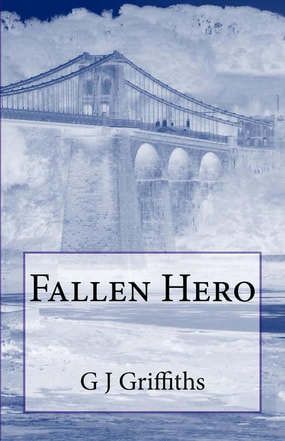
Well researched, for some early chapters will evoke memories of the near poverty-stricken post-war society, for others they will make us realise `that we never had it so good'. Griffiths uses his technical know-how to good effect illustrating the technological world of photography in which Squires is professionally immersed, then his imagination, to project into the developing communication systems of the late 2010s. Something intrigues me about a novel where fiction and historical fact meet - a la Jack Higgins, perhaps - the two are certainly intertwined here, enabling the author to create a sense of uncertainty as to how the great American leader, General Patton met his final demise. Unlike Higgins there is little `rough and tumble' or thuggery to establish as to who is top dog, nor, blessingly so, is the plot `moved on' by the intervention of the ringing tone of a mobile phone. Variety of scene - the rough seas encountered on the ferry journey across the Irish Sea as Squires travels back to Liverpool from holidaying in the Isle of Man to the peaceful reverence of the Hamm War Memorial in Luxembourg - and essential changes of location - downtown San Francisco with its hustle and bustle to a peaceful day trip in the rolling hills of North Wales - all blend together to make this, the author's debut novel, highly readable. I certainly recommend this book, indeed, I trust the author does not rest on his laurels and is now working on his next novel......in his heyday, Jack Higgins managed to write at least gripping tale a year!! To see the full range of Fallen Hero reviews click here for Amazon UK And here for Amazon USA. |
A selection of Amazon 5* reviews for SO WHAT! STORIES OR WHATEVER!
I was told that this was intended to be series of stories but when I read it seemed structured more like a novel, albeit with individual anecdotes included here and there. The book tells the tale of a men, Robert Jeffrey, who sets out to prove to himself (and his father under whose shadow he always seems to be) that he can become a Science teacher who will motivate children and get them to enjoy Science. Therefore, the setting is very much a school one and it is so realistically portrayed that I suspect the author has been, or maybe still is, a Science teacher. The classroom scenes and the interaction of the teachers among themselves and with their pupils are brilliantly described. They really do make for riveting reading. The plot itself is rather a loose one, which perhaps accounts for its being described as a collection of tales and basically focuses on Robert Jeffrey's progression from a newly qualified teacher, bright eyed and bushy tailed but as naïve as he is well intentioned, to a highly respected and experienced member of staff and his encounters with a particularly unpleasant bully boy, Kyle, (good name for a bully!) who has no respect for authority or, indeed, anyone. His exploits are very epitomized by his physical and mental bullying of the brothers Adam and Nigel Shantra, two intelligent and well behaved boys who are no match for bully boy Kyle at school. The characterisation in the book is one of its strongest features. Robert Jeffrey, around whom all of the action revolves, is a multi-faceted character who exhibits a combination of strengths and weaknesses in a complex mix. The adult reader can empathise with him very easily whilst the young adult reader (yes, this is a rare example of a book that falls equally easily into more than one genre) will identify with the brothers Shantra equally easily. But perhaps the most impressive feature of the book is the denouement - don't worry, no spoiler alert necessary - which comes in the form of an Epilogue and has the protagonist and the schoolboys, now grown men, meet in unexpected circumstances. This last chapter had such a powerful effect that I read it three or four times, so cleverly constructed it was. This is a book which will stay in the mind of the reader long after it has been put down and I recommend it unequivocally.
He finds that being a teacher stretches his abilities almost to the limit, daily dealing with large numbers of children, imparting a sense of enjoyment and understanding of his subject, while keeping order, discipline and above all his sense of humour. Many of the children help with this latter necessity often unwittingly - Clare and Samantha among others! Through the years his pupils' escapades provide lots of amusing, and sometimes thought provoking, moments for the reader. After many years, Mr Jeffrey's successful career seems to be coming to an unfortunate conclusion. However there is an unexpected and surprising twist at the end of the book. This was an enjoyable and engaging story and I look forward to G J Griffith's next book.
I thoroughly enjoyed G J Griffith’s first novel – Fallen Hero – and looked forward to his second.....which, surprisingly moved from the battlefield to the classroom. In a former life, I was a teacher in a secondary school – I suspect G J Griffiths might well have been seen in front of a class full of eager learners as well – and as I progressed quickly through the book I journeyed back through my career, the underlying theme and the anecdotes being so realistic to my experiences. The plot which has an unexpected, but fulfilling climax, the good guy winning, holds you throughout, allowing time for the author to introduce and develop character driven anecdotes......it was these which made me think, “yes, I was there”.....the openly disruptive child, the would-be criminal designed for a spell of ‘Her Majesties Pleasure’, the hard working, pleasant, polite pupil [often overlooked by a teacher when describing ‘a day in the classroom’] and then, of course, the inter-staff relationships, at which pupils could only guess. You don’t have to be a teacher to appreciate the intricacies of this book as, after all, we’ve all been there... in the classroom where so much of life’s experiences have their foundation. I believe there is sufficient scope for G J Griffiths to write a sequel...I truly hope so.
G J Griffiths tells us that in the neighbourhood of the school where most of the action takes place, Walnut Groves Estates, “it was unlikely that you would encounter any trees, walnut or otherwise.” It can be a grim place, and a rough environment for any teacher, even one as resolute and as savvy as the likeable protagonist, Robert Jeffrey. But Mr. Jeffrey succeeds remarkably well, thanks to his tough-mindedness, his strength in parrying the moves of the manipulative kids who come to school to play power games with each other and with him, his emotional intelligence, and his ability to see the humor, often the dark humor, in absurd situations. The book is at its best in its portrayal of the extraordinary complex relationships between a good teacher and his students. He is, by turns, an instructor, enforcer, opponent, shoulder to cry on, inspirational leader, and goad. Sometimes he’s even a potential victim, saved by a caring student. As for drama, you’ll find more of it in this book than in the average cable series. You name it—romance, conflict, violence, slapstick, child abduction, revenge. This book has it all. And then there’s the surprise ending, in which— well, I wouldn’t want to spoil it. I recommend the book to anyone who enjoys a good read. And in particular, for teachers, those contemplating a teaching career, parents, and students who want to see how they look from the other side, it’s a must-read. To see the full range of So What! reviews click here for Amazon UK And here for Amazon USA.
‘And it can grip things with its testicles. It can squeeze you to death with them!} Oh my goodness however does a teacher keep a straight face even though I serious question from a student? Some of the book was quite serious and kind of scary actually as well, what do you do when a student threatens you? No way I could do that job. Teachers sure do earn their pay I recommend this book!
In So What! Stories or Whatever! G.J. Griffiths offers us a very realistic academic world. Readers follow Robert Jeffrey through his career at a high school in Britain. As a Gen Xer myself, I am amazed at how lippy kids have become to teachers. I realize that this is fiction, but I also realize that every writer writes with a grain of truth. Dialog is tricky unless you can imagine the words being said. Griffiths offers up some very realistic dialog. I literally laughed out loud quite a few times. Mr. Jeffrey is a sympathetic character without asking for sympathy. I imagine being a teacher in middle school and high school (especially in today’s world) is not for the faint of heart. The twist at the end is great and really pulls the whole set of stories together! I highly recommend this book – especially to teachers!
A Nice read!
To see the full range of So What! reviews click here for Amazon UK And here for Amazon USA. An extract from Mules; Masters & Mud - the sequel to The Quarry Bank Runaways.
It is the chapter about the runaway apprentice Thomas Priestley when, as an adult, he is wounded while attending what became known as the Peterloo Massacre. Chapter Ten: Injury On a fine sunny morning in August 1819 Thomas, with eight other cotton workers, was travelling on a horse drawn cart to Manchester. The road from Mellor was not one of the best in wet weather, but the rain had stopped as they joined the turnpike road, passing through Stockport, to pick up Tommy and some other club members, when everyone was in high spirits. They were all looking forward to hearing Henry Hunt speak to an assembly of people on Parliamentary reform and against the Corn Laws, for which the high price of food was being blamed. The many peaceable workers, like Thomas, had high hopes for a non-violent orator like Hunt to bring to the attention of the government the claims of “ordinary folk” of the causes for the many hardships in their lives. It was rumoured that hundreds would be there in St. Peter’s Fields and that it would remain peaceful enough for women and children to be present. ‘Wotcher, Tommy, ’ow’s things?’ ‘Pretty fair, Jacob, pretty fair... What’s that clothes prop for, then? It looks like a flag.’ ‘Clothes prop? Nay, mate that’s me banner demandin’ the vote, ain’t it.’ Jacob was a secret convener of club meetings and groups for the surrounding mills of Stockport. He had become quite a confidante of Thomas and Will Souter and kept them informed as much as he could about changes in employment law and other developments. He had listened to Francis Place speak against the Combinations Acts and had joined the march two years earlier when the workers had hoped to present a petition to the Prince Regent in London. The large group of protesters had walked but a few miles south of Manchester when troops had broken it up, causing more dissidence to spread to many more workers. There were eight leather flagons on the cart with contents that added much to the holiday mood amongst the men aboard. As soon as the scrumpy cider had all disappeared everyone was agreed the ale would be most welcome. Even with an early morning start to the journey the cart was not going to reach Manchester much before lunchtime. Frequent stops for the relief of eight bladders had a lot to do with the delays and word had reached the pie-men and other purveyors of food about the meeting on St. Peter’s Fields. The suppliers of such refreshments were scattered along the route every half mile or so and they were doing well. The cart from Mellor found it was one of very many by the time they reached Ancoats. Most of the men on the cart had never been to Manchester and while they were most impressed by the many enormous mills that towered above them, they were alarmed to see how densely populated the area was. Dozens of people walked to and fro while small gangs of small children played in the filth. ‘Where do all these people live?’ asked Thomas. ‘Why in these tenements an’ back-to-back houses, Tommy. Oh, an’ though they’ve got better roads around ’ere it’s for the convenience o’ the mill owners an’ merchants, see: for the transport o’ bales an’ what ’ave thee.’ ‘Look at the state o’ the roads,’ said Tommy. There were piles of discarded bits of broken furniture, rotting vegetables, filthy soiled clothing and stinking excrement littering the sides of a yellow stream. The yellow stream was an open running sewer that would eventually find its way into the Rochdale Canal or either of the rivers Mersey or Irwell. ‘Aye, an’ ’alf these ’omes ’ave got no privies or plumbin’, pal,’ said Will. ‘No surprise, there’s so many poor kiddies dead afore they’re ten around the town, eh,’ he continued. ‘Thee can nigh see th’ miasma that’s acomin’ up off them streets; causin’ all sorts o’ diseases, see.’ The wagoner driving the cart was attempting to find a way through Redhill Street and as they passed by the enormous eight storey edifice that was McConnel’s Mills he told Jacob that he was about to stop. ‘See, Jacob, ah needs ter find a farriers ter attend to me hoss… Mebee, a stable somewhere round ’ere, if ah can… Hoss is trottin’ a bit lame, see.’ ‘No problem, mate,’ replied Jacob. ‘It ain’t that far ter walk from here… Ah knows the right road. We go past th’ Infirmary on Piccadilly?’ The wagoner nodded and the workers got down from the cart, still in high spirits, chatting about the high hopes they had about Orator Hunt and what they expected to hear in his speech. There were no open public spaces neighbouring the many mills; no parks for the group to stroll through or sit and chat; no public buildings nor churches with churchyards. Everything about the place where they had stopped was about cotton: scotching it; carding it; spinning it; weaving it and selling it. They were in the growing heart of Cottonopolis. The group from Mellor and Stockport were amazed to see dozens of wagons and carts lined up around the streets bordering St. Peter’s Fields. But the sheer numbers of happy people, men, women and children, congregating upon the site meant for the speeches was a shock – there were many, many thousands and they all seemed to be in the same holiday mood as all of the club members. There were sideshows, entertainers of all kinds, pedlars and stalls with refreshments; the carnival atmosphere belying the serious nature of the reasons for such an assembly of thousands from the working classes of the north of England. Henry Hunt’s reputation as a radical reformer had reached the local magistrates and they had called upon the Yeomanry of Manchester and Cheshire to stand by in case of insurrection from the crowds. A narrow passage, lined by constables, allowed Hunt and others to approach the raised platform amidst the packed assembly and the suffocating heat of the middle of the August day. Watching from his room at the corner of St. Peter’s Field the chairman of the magistrates was encouraged by Hunt’s enthusiastic reception to issue warrants for the arrest of the speakers and send orders for dispersal of the assembly. He feared for the preservation of the peace, ensuing riots and, therefore, that lives and property were in danger; not only that but he assumed what he saw was but a part of a nationwide rebellious movement. The speeches began; banners were waved; repeal of the Corn Laws was demanded; shouts and cheers followed; universal suffrage was reasonably demanded; more cheers and cries of: ‘Hear, hear! Well said, sir! Hurrah, that’s right!’ could be heard above the holiday hum of the crowd. Up on their platform Hunt and his entourage were growing ever more animated and arms were raised, waved in the way of many a country church choir master. The people, many still dressed in their plain working clothes, were unaffected by the contrast with the fine apparel worn by the lecturers. Ordinary people were whooping and applauding with such exuberance that they could be heard miles away. The swelling sound was now about to be misinterpreted by the Yeomanry, strategically assembled to the west and east of St. Peter’s Fields, supported by hundreds of constables and a company of hussars. The poorly trained, volunteer cavalrymen of the Yeomanry were commanded by Captain Birley, who was also a local factory owner. It was not ten minutes after one thirty when the captain led his cavalry towards the platform of speakers. This was to assist the chief of constables and his men in the arrest of those same speakers. In attempting to force their way through, the horsemen lost all sense of self-control and drew their sabres, hacking their way through everyone in their path, men, women and children! In the panic of people trying to get out of the way the untrained horses reared and plunged into them, injuring many more. When the arrest warrant had been served by the police officer, the Yeomanry then set about seizing and destroying the many flags and banners, and to disperse the crowd further. But this was not possible while the main exit from the area was blocked by rows of foot soldiers with fixed bayonets. Thomas and Jacob became incensed at the sight of a large group of flag-carrying women from a female reform society, all dressed in white, who were being savagely attacked by horsemen. More spilt blood conflicted horribly with the white dresses of the women and a few brave souls attempted to defend themselves with their short flag staffs. With eyes as wild as those of their steeds the cavalrymen slashed out, not caring whether the flags parried their deadly sabres or whose head was split open. ‘Come on, Jacob!’ yelled Thomas as he flung himself forward at one of the horsemen and held on to his weapon arm. The man would not be pulled down from the saddle and received a hefty blow to his back from Jacob’s banner pole. This was then a signal to the soldier’s comrades to turn their attention to the two men and rain blows upon them. Thomas and Jacob were not alone in attempting to return the fight physically, while the many brickbats and loud curses from the people heard by the magistrates caused them to rouse the hussars into the fray. ‘The crowd must be dispersed! The yeomanry are now being assaulted! Go to it!’ they ordered the officer commanding the hussars. Within ten, or maybe, fifteen minutes the assembly in St. Peter’s Fields had been dispersed, although riots continued throughout the streets of Manchester for hours. Bloodied and injured bodies in their hundreds strewed the area and later it was found that there were eleven fatalities among them, including nine men and two women. Thomas and Jacob, with three of the women reformers, lay unconscious where they fell. They were surrounded by others, similarly wounded and bleeding, unable to hear the groans and cries of pain that arose like an invisible cloud of doom over the field. |
